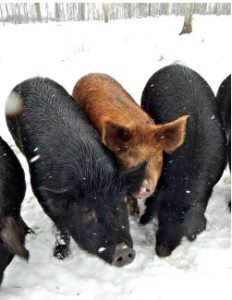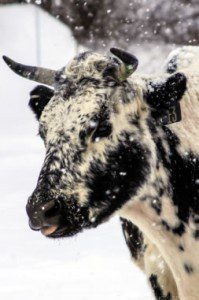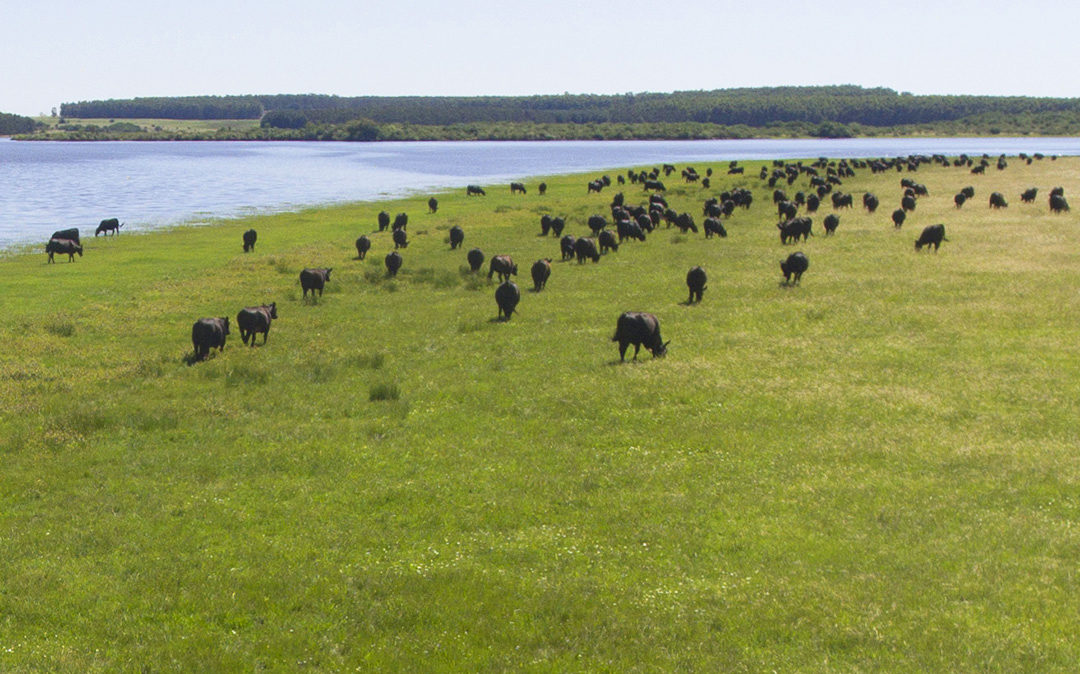 Stonington, Connecticut
Stonington, Connecticut
Founded by the Tillman-Brown Family in June of 2011, Firefly Farms is a 135-acre farm in North Stonington, Connecticut. The family is committed to raising heritage chickens, pigs and cattle in a natural and humane environment.
Firefly Farms has grown from an original herd of five piglets to a diverse number of hogs – Mulefoots, a Red Wattle, Guinea Hogs, and Tri-Heritage. They have a growing herd of Randall Lineback cattle and a flock of Dorking chickens. Each of their breeds is either critically endangered or threatened according to The Livestock Conservancy. None of their breeds numbers more than 1,000 in the world.
“It may seem to be a conflict that we raise these rare animals for meat, but the reason that they’re endangered is that they lost popularity in favor of other breeds when factory farming became prevalent,” said Allena Tillman-Brown. “To bring them back from endangered, we need to give them renewed purpose and raise them for their original intent, food. This makes every animal we raise precious and critical to the overall survival of the breed.”
Firefly Farm animals are all pasture or forest raised. In addition to their supplemented diets, they are allowed to forage for food and are kept in environments natural to their species.
“Our pigs live in large groups in the woods, foraging, sleeping in piles, and enjoying the very essence of being a pig,” said Allena. “Our piglets stay with their mothers until they are naturally weaned, as do our calves. Our cows have a variety of pastures to suit their needs and the chickens have chicken tractors (movable chicken coops without floors) that are moved twice daily to give them access to fresh grass. Except for protective fences, our animals get to live as their ancestors did.”
Firefly Farms also uses rotational grazing, which keeps the animals moving so no one area is negatively impacted by their presence and the animals always benefit from having fresh grazing land to explore.
“A certified forester who specializes in woodland restoration showed us where to create new pasture and how to improve the overall health of the existing forest,” said Allena. “Our pigs have done a wonderful job removing scrub brush and invasive species so native flora and fauna can return. They love to be turned out on new pasture with all the joys of finding new areas to root and wallow.”
 Firefly Farms first learned about Certified Humane® from Craig Floyd of Footstep Farm, the first Certified Humane® farm in Connecticut. Dugan Tillman-Brown, Firefly’s farm manager, realized he had already been naturally implementing many of Certified Humane® standards to provide the farm’s animals a stress-free environment.
Firefly Farms first learned about Certified Humane® from Craig Floyd of Footstep Farm, the first Certified Humane® farm in Connecticut. Dugan Tillman-Brown, Firefly’s farm manager, realized he had already been naturally implementing many of Certified Humane® standards to provide the farm’s animals a stress-free environment.
“It seemed like a natural next step to become Certified Humane®,” said Dugan. “Humane Farm Animal Care’s goals and our goals are one and the same.”
As of January 2015, all four family members work for Firefly Farms in various capacities. Van Brown handles the bookkeeping and correspondences, Beth Tillman works with Dugan Tillman-Brown on Firefly Farms; and Allena Tillman-Brown handles marketing and events.
All of them, however, have been boar wranglers, mother hens to various babies, and educators for people interested in learning about how to operate a family farm that keeps the health and well-being of the animals as their number one priority.
“Just because these animals are raised for food, doesn’t mean we do not love them, care for them, and play with them,” said Allena. “We are with them at birth and walk alongside them to the end. Our mission is to make sure each animal has quality of life here.”
To learn more, visit www.fireflyfarmsllc.com.



Posted: May 20, 2015 by Certified Humane®
Firefly Farms
Founded by the Tillman-Brown Family in June of 2011, Firefly Farms is a 135-acre farm in North Stonington, Connecticut. The family is committed to raising heritage chickens, pigs and cattle in a natural and humane environment.
Firefly Farms has grown from an original herd of five piglets to a diverse number of hogs – Mulefoots, a Red Wattle, Guinea Hogs, and Tri-Heritage. They have a growing herd of Randall Lineback cattle and a flock of Dorking chickens. Each of their breeds is either critically endangered or threatened according to The Livestock Conservancy. None of their breeds numbers more than 1,000 in the world.
“It may seem to be a conflict that we raise these rare animals for meat, but the reason that they’re endangered is that they lost popularity in favor of other breeds when factory farming became prevalent,” said Allena Tillman-Brown. “To bring them back from endangered, we need to give them renewed purpose and raise them for their original intent, food. This makes every animal we raise precious and critical to the overall survival of the breed.”
Firefly Farm animals are all pasture or forest raised. In addition to their supplemented diets, they are allowed to forage for food and are kept in environments natural to their species.
“Our pigs live in large groups in the woods, foraging, sleeping in piles, and enjoying the very essence of being a pig,” said Allena. “Our piglets stay with their mothers until they are naturally weaned, as do our calves. Our cows have a variety of pastures to suit their needs and the chickens have chicken tractors (movable chicken coops without floors) that are moved twice daily to give them access to fresh grass. Except for protective fences, our animals get to live as their ancestors did.”
Firefly Farms also uses rotational grazing, which keeps the animals moving so no one area is negatively impacted by their presence and the animals always benefit from having fresh grazing land to explore.
“A certified forester who specializes in woodland restoration showed us where to create new pasture and how to improve the overall health of the existing forest,” said Allena. “Our pigs have done a wonderful job removing scrub brush and invasive species so native flora and fauna can return. They love to be turned out on new pasture with all the joys of finding new areas to root and wallow.”
“It seemed like a natural next step to become Certified Humane®,” said Dugan. “Humane Farm Animal Care’s goals and our goals are one and the same.”
As of January 2015, all four family members work for Firefly Farms in various capacities. Van Brown handles the bookkeeping and correspondences, Beth Tillman works with Dugan Tillman-Brown on Firefly Farms; and Allena Tillman-Brown handles marketing and events.
All of them, however, have been boar wranglers, mother hens to various babies, and educators for people interested in learning about how to operate a family farm that keeps the health and well-being of the animals as their number one priority.
“Just because these animals are raised for food, doesn’t mean we do not love them, care for them, and play with them,” said Allena. “We are with them at birth and walk alongside them to the end. Our mission is to make sure each animal has quality of life here.”
To learn more, visit www.fireflyfarmsllc.com.
Posted: May 20, 2015 by Certified Humane®
Hawaii Lowline Cattle Company
Located on a total of 400 acres in Honokaa, Hawaii, the Hawaii Lowline Cattle Company was started by Rick and Haleakala Sakata and Dwayne and Tammie Cypriano in 2005.
The two families run every aspect of the farm themselves, from farm animal care to administrative and marketing duties. They want to advance Hawaii’s food self-sufficiency by building a herd of Lowline Angus cattle on their ranch. According to Sakata, Hawaii Lowline Cattle Company is part of a resurgence in Hawaii of raising and finishing cattle locally and on pasture land. Their farm raises the only registered Lowlines in the state of Hawaii.
Originating in Australia, Lowlines are Angus beef cattle that are only about half the typical “Angus” size – 500 pounds for heifers and 550 pounds for steers. “Two Lowlines can use the pasture space of one of today’s larger breeds, providing more beef per acre of grass and making the land more productive,” said Sakata. “That’s very important on an island with limited pasture space.”
Hawaii Lowline Cattle Company raises cattle in a stress-free environment. The bulls and cows are out on the farm’s grass pastures all year-round, eating a natural diet of grass and forage, thanks to Hawaii’s mild climate. They are never fed on feedlots. The farm also rotates pastures to reduce over grazing and to maintain the quality of grass in each paddock.
“We really love doing this and care about the animals living naturally on the land,” said Sakata. “They are very gentle and so require gentle handling. We don’t need horses to corral them; they pretty much come when we call them.”
As more and more people learn about Certified Grass-Fed Beef, “it became important for us to let consumers know what that means in terms of how the animals are raised,” said Sakata. “Becoming Certified Humane was a natural next step. Their standards align with our beliefs and practices and assures the consumer of our commitment to animal welfare.”
Hawaii Lowline Cattle Company Certified Grassfed Beef is only sold in Hawaii. They also are certified by the American Grassfed Association and by Animal Welfare Approved.
“Our first island born calf was born in 2008,” Sakata says proudly. “A true Hawaiian.”
For more information, visit www.hawaiilowline.com.
Posted: May 13, 2015 by Adele Douglass
Don’t be fooled by food labels
Food labels can be confusing. These days, almost everyone is slapping labels onto egg cartoons and meat products to assure you that their products come from happy farm animals.
But the truth is, those labels don’t prove anything. Those labels don’t have standards or inspectors behind them. Those labels are often just words and gimmicks to get you to buy a product.
That’s why we ask you to look for the Certified Humane® label whenever you are buying meat, poultry, dairy or egg products.
As a nonprofit agency, Humane Farm Animal Care developed the Certified Humane® label to assure consumers that farm animals are raised under the highest standards as established by a scientific committee – all worldwide experts in farm animal care.
Not only do we put the Certified Humane® standards on our website for all to see, but unlike other programs, we also hire independent, third-party experts to inspect every farm in our program.
These inspectors are actual animal welfare experts who must have a Master’s degree or Ph.D. in farm animal welfare or in veterinary medicine before they can become an inspector for the Certified Humane® program.
This third party reporting ensures transparency and that Certified Humane’s® high standards of care are being met for the millions of cattle, pigs, chickens, laying hens, turkeys, sheep, goats, bison and dairy cows in the program.
What happens if a farm fails an inspection? They are not permitted in our program. There is no “phase-in” period for compliance. You must meet all of Certified Humane’s Animal Care Standards from day one.
The good news is, the farms we work with eagerly comply with Certified Humane’s Animal Care Standards. These farmers care deeply about their animals and want you to know, through the Certified Humane product label, that they are meeting Certified Humane’s standards of care.
As a consumer, you can be sure the Certified Humane® label is not a gimmick, but an actual program with inspectors and standards that farmers must follow in order to be in the program.
You can support farmers committed to animal welfare by shopping Certified Humane® today or by downloading the free Certified Humane app.
Through the power of your pocketbook, you can show the world that there are people who care about the humane treatment of farm animals.
Posted: March 13, 2015 by Adele Douglass
More than 12 years ago, HFAC set the standard to keep antibiotics and growth hormones out of our food supply
Here’s why.
Humane Farm Animal Care’s Animal Care Standards ensure that farm animals in our program don’t live in cages or gestation crates, but on farms where they have space to flap their wings and exhibit natural behaviors.
Our Animal Care Standards also prevent the use of antibiotics, growth hormones and animal by-products in farm animal feed. Our standards have prohibited the use of antibiotics since 2003.
Why is this part of the Certified Humane program?
Because it is more humane for farm animals and protects human health as well.
You see, in 1942, factory farms began using Penicillin experimentally on farm animals (before it was introduced to people). They did this because factory farming situations created tremendous stress on the animals, so much so that their immune systems were suppressed. Studies showed that hens fed low doses of Penicillin laid more eggs and pigs produced more surviving piglets.
Since then, factory farming practices have routinely used antibiotics to boost growth or increase reproduction in farm animals. This is because the animals did not get sick as much since these antibiotics were given daily in feed. This is called the sub-therapeutic use of antibiotics.
Today, more than 80% of farmers give sub-therapeutic use of antibiotics to farm animals to prevent diseases that occur because of factory farming practices, like overcrowding.
Certified Humane provides a better answer for farm animal care.
HFAC’s Animal Care Standards provides precise space requirements for each type of farm animal to reduce stress, overcrowding and the diseases that result, thus eliminating the need altogether of routine antibiotic use.
This is important because routine antibiotic use not only suppresses the immune system of farm animals, it increases the risk that people will develop antibiotic resistance too.
And, the issue of antibiotic resistance in people is a very serious issue. Antibiotics treat bacteria. If your body becomes resistant to an antibiotic and you are prescribed that specific antibiotic to kill the bacteria that has made you sick, it will not work to kill that bacteria and you could die. The drugs once used to treat illness no longer work anymore, meaning disease can get out of control because there is no longer any drug that can kill a specific bacteria.
Antibiotic resistance has become a “serious global health concern,” according to the World Health Organization. Knowing that farm animals receive antibiotics routinely – especially when they don’t need it – is the major cause of antibiotic resistance since we are eating the animals that are pumped with unnecessary antibiotics. That is what causes antibiotic resistance in people.
Certified Humane offers a much better approach to farm animal care that benefits both farm animals and people.
Since 2003, our Animal Care Standards has provided precise space requirements for each type of farm animal to reduce stress, overcrowding and the diseases that result, thus eliminating the need for routine antibiotic use. We allow antibiotic use for sick animals only – NOT for prevention, NOT to increase the size of an animal, and NOT to help animals produce more offspring. Last year alone, 96.7 million farm animals did not receive antibiotics because they were raised under our standards.
During National Nutrition Month, we hope you will ask your grocer to carry Certified Humane® Raised and Handled® label products. Your purchase supports the Certified Humane farmers who have stepped up to the plate this last decade and made the commitment to NOT give antibiotics or growth hormones to farm animals.
The Certified Humane® Raised and Handled® label gives consumers the confidence to know that farmers are raising their animals with the health and welfare of both farm animals and people in mind.
Posted: February 18, 2015 by Certified Humane®
Korin (Brazil) Agropecuária
In addition to the Antibiotic free (AF) broilers, the company is the largest Brazilian organic chicken producer, also delivering free-range broilers and eggs.
This progressive production system has a range of meaningful differences. Starting from the most basic handlings related to the farmers and their farms, to the final consumers due to choices motivated by tangible and intangible values.
According to Luiz Carlos Demattê Filho, Korin´s industrial director, one of the most substantial reasons to encourage the animal welfare introduction in production systems of various countries is the worldwide ongoing restrictions to antibiotics use in animal production. Thus, food companies are being guided by consumer preferences to improve production practices due to the strong connection between the non-use of those substances and human well-being issues. The following chart explains this relation:
Another important point that contributed to the prosperity of differentiation initiatives pointed out by Demattê is the “new” consumer profile that has been acquiring a greater awareness of ethics and issues related to food security.
Being a pioneer in alternative poultry production, the company generates and validates new technologies. To reach such status, Korin has a partnership in research and technological development with Mokiti Okada Research Center – (CPMO in Portuguese), an institution associated to Mokiti Okada Foundation in Brazil.
One of the CPMO´s research lines involves research activities related to Environment and Animal Welfare. The partnership outcomes have been contributing greatly to the enhancement of welfare issues and consequently to the improvement of the company production rates. The performed experiments are published in national and international scientific papers. They are framed as a way to promote and incentive other initiatives focused on animal welfare, human health and sustainability of production units.
For information on where to find other Certified Humane® products in your area, visit the “Shop” page of HFAC’s website.